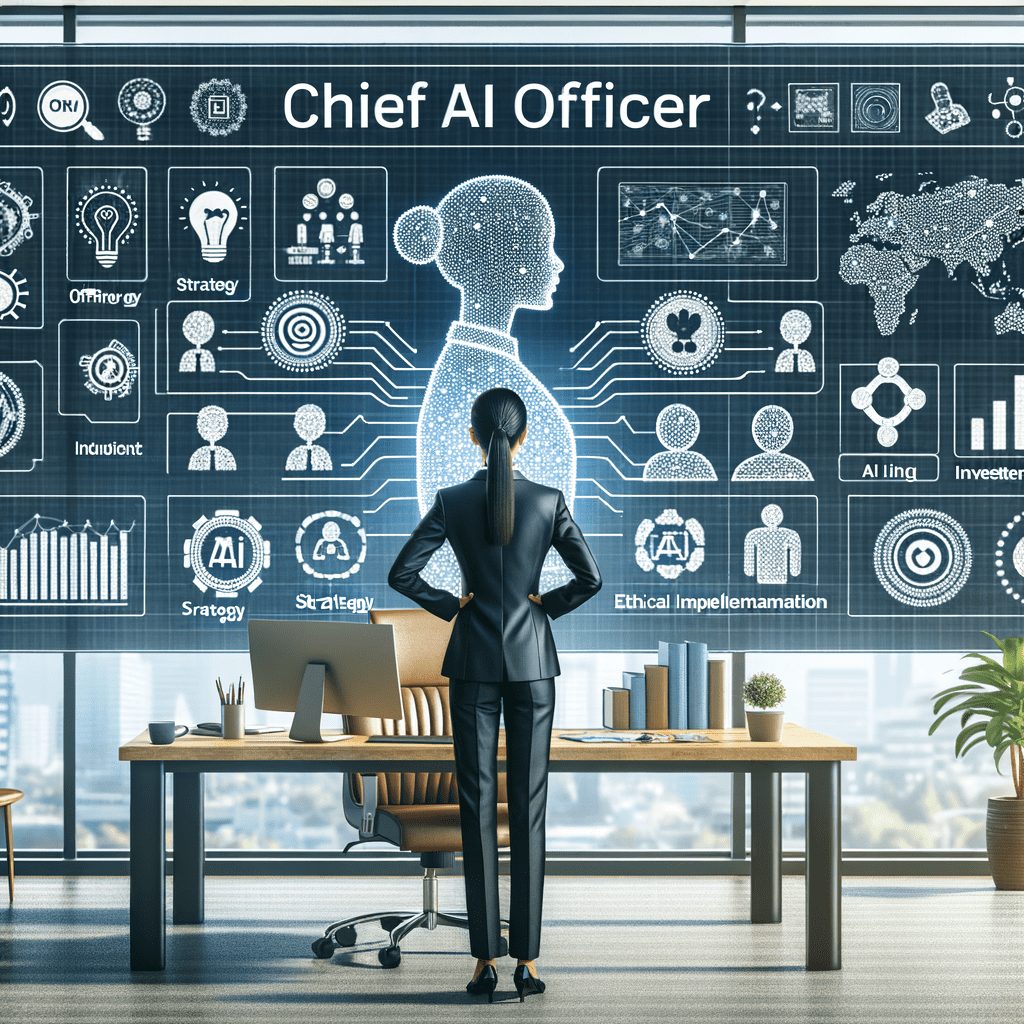Artificial intelligence is rapidly transforming businesses, prompting companies to rethink leadership. As AI becomes central to operations and strategy, organizations are considering the need for a Chief AI Officer (CAIO) to guide their artificial intelligence initiatives. This C-suite role aims to harness AI’s potential while managing risks.
The demand for dedicated AI leadership is increasing. Many companies recognize that AI requires specialized oversight to maximize benefits and mitigate pitfalls. This has led to more organizations looking to hire for CAIO roles within senior management.
Let’s explore the key reasons behind this emerging executive position and its impact on business success.
Driving AI Strategy and Innovation
A primary reason for a CAIO is to spearhead artificial intelligence strategy and innovation. A CAIO develops an AI roadmap aligned with business goals.
They identify and prioritize artificial intelligence use cases and coordinate initiatives across departments.
By having a dedicated executive focused on AI technologies, companies can ensure strategic integration into core business processes and products.
Ensuring Ethical AI Implementation
As artificial intelligence becomes more common, ethical concerns arise. A Chief AI Officer plays a crucial role in developing ethical AI guidelines and ensuring compliance. They address bias and promote fairness, transparency, and explainability in AI systems.
A CAIO navigates complex regulations around AI.
With a CAIO, companies build trust with customers and stakeholders by demonstrating a commitment to responsible AI practices.
Bridging the Technical and Business Divide
A challenge in AI adoption is the gap between technical capabilities and business needs. A CAIO translates complex AI concepts for business leaders. They also ensure AI projects align with strategic objectives.
This role is important as AI integrates into core business functions.
A CAIO guides this transformation, ensuring artificial intelligence initiatives deliver business value.
Managing AI Talent and Resources
Competition for AI talent is fierce. A Chief AI Officer attracts and retains top talent, and builds high-performing teams.
They allocate artificial intelligence resources effectively. CAIOs also foster a culture of continuous learning.
Centralized AI leadership creates a cohesive environment for AI professionals.
Mitigating AI Risks and Ensuring Compliance
As artificial intelligence systems grow in complexity, associated risks increase. A CAIO identifies and mitigates AI-related risks. They ensure compliance with regulations.
Robust artificial intelligence governance frameworks are implemented by a CAIO. They also manage data privacy and security concerns related to artificial intelligence.
This proactive risk management helps companies avoid costly mistakes as they scale AI applications.
Accelerating AI Adoption and Integration
Many organizations struggle with AI adoption speed. A dedicated CAIO accelerates this process by streamlining processes.
They facilitate cross-functional collaboration on artificial intelligence projects and develop learning programs for employees. Creating a centralized artificial intelligence infrastructure and best practices is also part of their role.
By removing barriers, a CAIO helps companies capitalize on artificial intelligence opportunities and stay competitive.
Measuring and Communicating AI Impact
Measuring the impact of AI initiatives is challenging. A CAIO develops metrics to measure AI’s business impact and creates dashboards to track performance.
They communicate AI successes to stakeholders. Advocating for artificial intelligence investment at the executive level is important for this role.
By demonstrating AI’s value, a CAIO secures support and drives buy-in for initiatives.
Fostering AI-Driven Innovation
AI can revolutionize products and business models. A Chief AI Officer identifies opportunities for artificial intelligence innovation. They lead AI research and development (R&D) efforts. They can implement generative ai solutions for better business practices.
Collaboration with startups and academic institutions on cutting-edge research is part of the CAIO’s duties.
This focus on AI technology helps companies stay ahead.
Ensuring AI Scalability and Sustainability
As artificial intelligence initiatives scale, a CAIO designs scalable architectures. They implement best practices for management and maintenance.
CAIOs ensure AI systems are robust. They develop strategies for sustainable growth. Their role within an organization also includes maintaining privacy policies for data and compliance.
By focusing on scalability and sustainability, a CAIO ensures long-term success.
Navigating the AI Ecosystem
The artificial intelligence landscape is complex, with various vendors and technologies. A CAIO evaluates and selects AI vendors and partners.
They manage relationships with stakeholders and participate in industry groups. CAIOs also stay informed about emerging trends.
This ecosystem management provides companies access to the best resources.
FAQs about Why Companies Need a Chief AI Officer
Why does every company need a chief AI officer?
Not every company needs a chief ai officer, but those heavily investing in AI benefit greatly. A CAIO provides leadership on strategy, ethics, and implementation, aligning initiatives with business goals responsibly.
Do I need a chief AI officer?
The need for a Chief AI Officer depends on your company’s size, industry, and AI adoption. If AI is central to your strategy, a CAIO provides expertise. For smaller companies or those starting with AI, the role might be premature. Hiring someone to help your company’s strategic initiatives will determine how successful you will be with AI implementation.
What does a chief AI officer do?
A chief ai officer oversees AI strategy, implementation, and governance. They manage AI talent and resources. The CAIO bridges the gap between AI capabilities and business needs.
Driving artificial intelligence innovation and ensuring ethical use are also part of the job. AI strategies can help an organization find new competitive advantages. Your ai strategy will determine how successful your business will be in utilizing the transformative potential of machine learning.
The CAIO must have good management development and technology officer skills. They must have excellent technical expertise when working with the CAIO team. Your organization should already have data officer roles in place.
How much do chief AI officers make?
CAIO salaries vary depending on company size, industry, and location. As a new C-suite position, salary data is limited. CAIOs command competitive salaries, often comparable to other technology roles.
Concluding the Chief AI Officer's Impact
The Chief AI Officer role reflects AI’s growing importance. Several reasons justify this role, from driving innovation to managing risks. While not all organizations require a dedicated CAIO, those leveraging AI’s potential should consider it. An AI officer brings needed technical expertise and is a role dedicated to the success of your AI deployment.
A Chief AI Officer provides the leadership and expertise to navigate the complex AI landscape and deliver value. Achim Plueckebaum and Ann-Christin Andersen can attest to that fact. Corinne Avelines and Anja Lagodny can also tell you that it’s the right move for any business with a strategic roadmap that wants to align their business needs to the power of AI. This dedicated ai role should help companies with ai solutions in order to successfully implement their corporate vision.
As AI reshapes industries, a strategic AI leader becomes a key differentiator. The question isn’t just why you need a Chief AI Officer, but how quickly you can integrate this expertise into your leadership. A good caio helps you align ai initiatives for optimal success and ensures they know their caio’s responsibilities within the organization. AI should help to transform businesses into well-oiled, efficient, and highly productive entities. Artificial intelligence is more than just a silver bullet, but an officer ai position, according to Michael Wade, is a crucial part of the overall vision and strategy. This can increase business value by better managing the processes behind machine learning algorithms. With increased efficiency your data management can be automated, machine learning can streamline operations to greater profitability and improve operational efficiency. Data management improvements and a dedicated focus on leveraging AI can help with enhancing customer experiences. This means there will be dedicated AI teams to ensure there are resources and proper management focused on transforming businesses through dedicated teams. This can only work with proper implementation which can help in better understanding regulatory considerations.
There should be a specific ai strategy with a clear plan to align your vision with current ai applications for success. A dedicated Chief AI Officer can help employees embrace and learn the transformative potential of AI within your company, ensuring artificial intelligence is not a temporary investment but something that is built into the organization. With proper AI applications, businesses should see overall improvements in operational efficiencies while bettering the overall customer experiences. Employees should undergo regular training as part of their overall learning experience and development plan.



